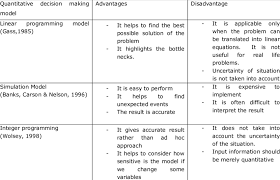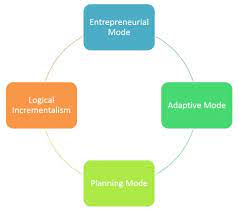Mastering the Art of Rational Decision Making: Answers to 5 Common Questions
- What is the process for making rational decisions?
- How can I evaluate options to make a rational decision?
- What techniques can I use to make sure my decisions are rational?
- How do I weigh the pros and cons when making a decision?
- How can I ensure that my decisions are based on sound reasoning?
What is the process for making rational decisions?
The process for making rational decisions involves several steps, including:
Clearly define the problem or decision to be made: This involves identifying the issue at hand and understanding what needs to be accomplished.
Gather information: This involves collecting data and information that is relevant to the decision being made. It is important to consider all available options and alternatives.
Identify criteria for the decision: This step involves determining what factors are important in making a decision. These criteria should be based on the goals and objectives that need to be achieved.
Evaluate alternatives: This step involves weighing the pros and cons of each alternative against the identified criteria. It is important to consider both short-term and long-term consequences of each alternative.
Choose the best alternative: Based on the evaluation of alternatives, choose the option that best meets the identified criteria and achieves the desired outcome.
Implement and monitor: Once a decision has been made, it is important to implement it effectively and monitor its progress. This will help ensure that any necessary adjustments can be made along the way.
By following this process, individuals can make informed decisions that are based on careful consideration of all available options and relevant information.
How can I evaluate options to make a rational decision?
Evaluating options is a critical step in making a rational decision. Here are some steps to help you evaluate your options:
Identify your criteria: Determine what factors are important to you in making this decision. For example, if you are deciding which car to buy, your criteria may include price, fuel efficiency, safety features, and reliability.
Assign weights: Assign a weight to each criterion based on its importance to you. For example, if safety is the most important factor for you when buying a car, then assign it a higher weight than other criteria.
Evaluate each option: Evaluate each option against your criteria and assign a score to each option based on how well it meets each criterion. You can use a numerical scale (e.g., 1-10) or a descriptive scale (e.g., poor, fair, good).
Multiply scores by weights: Multiply the score of each criterion by its weight and add up the results for each option.
Compare results: Compare the total scores for each option and choose the one with the highest score.
It’s important to note that this process is not foolproof and there may be other factors that come into play when making a decision. However, using this process can help ensure that you are making an informed decision based on your priorities and preferences.
What techniques can I use to make sure my decisions are rational?
There are several techniques you can use to ensure your decisions are rational. Here are a few:
- Identify your goals: Before making any decision, it’s important to know what you want to achieve. Clearly define your goals and prioritize them based on their importance.
- Gather information: Do your research and gather as much information as possible about the options available to you. This will help you make an informed decision.
- Consider the pros and cons: Make a list of the advantages and disadvantages of each option. This will help you weigh the benefits and drawbacks of each choice.
- Evaluate risks: Consider the potential risks associated with each option and assess how likely they are to occur.
- Use logic: Apply critical thinking skills to evaluate each option objectively, without letting emotions cloud your judgment.
- Seek advice: Consult with trusted friends, family members or professionals who have experience in the area of your decision-making process.
- Take time: Don’t rush into making a decision, especially if it’s an important one. Take time to reflect on all of the information gathered before making a final choice.
By using these techniques, you can increase the likelihood that your decisions will be rational, well-informed, and ultimately lead to positive outcomes for yourself and those around you.
How do I weigh the pros and cons when making a decision?
Weighing the pros and cons is a common and effective way to make decisions. Here are some steps you can follow to weigh the pros and cons of a decision:
- Identify the decision you need to make: Start by clearly defining the decision you need to make. This will help you focus your thinking and identify the specific pros and cons that are relevant.
- Make a list of pros and cons: Write down all of the potential benefits (pros) and drawbacks (cons) associated with each option. Be as comprehensive as possible, considering both short-term and long-term consequences.
- Assign weight or value to each pro and con: Once you have your list, assign a weight or value to each pro and con based on how important or significant it is to you. This will help you prioritize your considerations.
- Compare the lists: Compare the two lists side-by-side, taking note of any similarities or differences between them.
- Consider trade-offs: Consider whether there are any trade-offs between the pros and cons that might influence your decision. For example, one option might have more benefits but also more drawbacks than another option.
- Make a decision: Based on your analysis of the pros and cons, make a decision that feels right for you.
Remember that weighing pros and cons is just one approach to decision making, and it may not be appropriate for every situation. It’s important to consider other factors such as your values, intuition, emotions, and external circumstances when making decisions as well.
How can I ensure that my decisions are based on sound reasoning?
Ensuring that your decisions are based on sound reasoning is important to make the best choices for your life. Here are some tips to help you make decisions based on sound reasoning:
Gather information: Before making a decision, gather as much information as possible about the situation. This can include researching online, talking to experts, or consulting with others who have experience in the area.
Identify your goals: Clearly identify what you are trying to achieve with your decision. This will help you focus on what is most important and avoid distractions.
Consider all options: Consider all possible options before making a decision. Don’t limit yourself to just one or two choices, but instead explore all possibilities.
Evaluate the pros and cons: Make a list of the pros and cons of each option and evaluate them carefully. Consider how each option aligns with your goals and values.
Seek advice: Seek advice from trusted friends, family members or professionals who have experience in the area where you need to make a decision.
Use critical thinking skills: Use critical thinking skills such as logic, reasoning, and analysis when evaluating options and making decisions.
Take time to reflect: Take time to reflect on your decision before making it final. Weigh the options carefully and consider whether this is truly the best choice for you.
By following these tips, you can ensure that your decisions are based on sound reasoning and that you are making choices that align with your goals and values.



